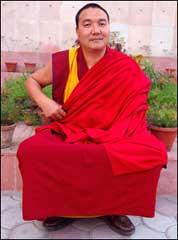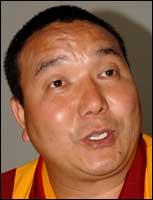 | « Back to article | Print this article |
 "The word soon spread that I have been nominated for the Grammy. My father is not alive but my mother, brothers and sisters -- who took a while to understand what the award was all about -- were delighted," says Lama Tashi, as friends and colleagues call him. Incidentally, a group of Buddhist monks from Himachal Pradesh won a Grammy in the World Music category two years ago.
"The word soon spread that I have been nominated for the Grammy. My father is not alive but my mother, brothers and sisters -- who took a while to understand what the award was all about -- were delighted," says Lama Tashi, as friends and colleagues call him. Incidentally, a group of Buddhist monks from Himachal Pradesh won a Grammy in the World Music category two years ago.
"For me, the nomination itself is a great achievement but if I get the Grammy it will be simply wonderful," Lama Tashi tells Rediff India Abroad Senior Associate Editor Onkar Singh.
In an exclusive interview before leaving for the United States for the Grammy Award ceremony (to be held on Wednesday), Lama Tashi says, "I know that I will be there amongst the greatest names of the singing world and that itself will be a great feeling." Excerpts:
What made you become a lama?
I grew up in a Tibetan Buddhist society spiritually, though I am an Indian living in a remote village in Arunachal Pradesh called Thembang in the West Kameng district of the state.
I come from the western part of the state, where Buddhism is the dominant religion. We observe all the rituals of Tibetan Buddhism. I had the opportunity of meeting His Holiness The Dalai Lama when he visited Arunachal Pradesh in 1983. I was there to receive the teachings and initiations of Buddhism from His Holiness. I was impressed with the simple life he lived and that is how I got attracted towards spiritualism and decided to become a monk.
How compatible are being a monk and making music?
![]()
More on rediff.com!
![]()
![]()
![]()
![]()
After Beckham, Chadha tries ads![]()
Meet Rang De's Sukhi ![]()
Pix: Bollywood's new star kids![]()
![]()
![]()
As part of our duty, we monks have chant devotional music and hence this comes to us automatically. I joined in a monastery in Arunachal Pradesh first and then I decided to go to Karnataka, to the largest Tibetan monastery. I went there to receive higher education in Buddhist philosophy.
I got attracted towards the chanting style that is called the Tibetan Multi-phonic Chants in the West. Whenever I went for prayers I would imitate the chanting sounds of other lamas and monks despite the fact that I was not trained to do that.
Seeing my devotion the principal of that monastery decided to admit me formally into the chanting group. I was studying Buddhist philosophical studies and did not have much time to do this. But my teacher encouraged me to take up chanting and here I am now before you and the whole world.
How long have you been doing this?
I must have been practising chanting for more then 15 years before I was appointed principal chant master of the same monastery, which I had served for more then four years.
Your thoughts on the Grammy nomination?
This is the best traditional world music album. It is strictly traditional and cultural. I have not modified anything. Not a tone of modern music has been added to it. I can vouch that it is 100 per cent ancient music. I feel good that they selected me from millions of albums.
I find it very fortunate that my first solo effort has been recognised. It will support my other projects, particularly the Tibetan Buddhist Chants.
Is that a particular kind of chant?
It's a sound produced from our vocal chords -- it is completely different from our regular voice. If you listen to it you will find that it is a completely musical sound. I spent a lot of time in getting the sounds right. Whenever I had the time I would go out to the garden and chant.
My friends said it was easy to find me because they just had to hear my voice in the garden to know where I was trying to modulate my voice!
It was a tough task but I had to do it. I joined the monastery in 1983 and I started chanting the next year.
Have you recorded any other albums?
Yes, I did four other albums with other monks. In three they took some of my chanting pieces.
Would you say going solo has been lucky for you?
(Laughs) Well, you can say so!
One of my albums was used for the soundtrack to the Hollywood movie Seven Years in Tibet. The albums which I did with the other monks were mainly meant for the monastery -- so that the devotees could be exposed to it. I have never used the art for commercial or any other reason.
I toured extensively and that gave me more opportunity to interact with American musicians and American people and this helped me to build a relationship with my friend Jonathan (Goldman, the producer of the album).
How did you meet him and how did it help?
I met him in Colorado, during one of my tours to America. We struck a chord and since then we have been together. The meeting took place in a strange manner. I led the chanting team in a show and after 15 minutes of the performance a man runs up to me and says, 'I am Jonathan Goldman and I am impressed with your music.'
We talked about chanting over dinner that night. He has been of great help to me, both financially and otherwise. One morning, he came and told me that he had bought a new recording machine that could work wonders and that he would like to record my chanting.
We went down to studio and he showed me how one chant could be converted into a thousand monks chanting together. We began recording in his home studio and eventually he came up with the suggestion that I should write the meaning of the chants in English and that we should put it up as an album. I allowed him to do that and it got a Grammy nomination. That is the short and sweet story of my album!
The album contains some of the mantras and dedications. It is awesome work. It was Jonathan's son who came up with the title Tibetan Master Chants.
What if you win the Grammy?
Just the nomination itself is a great honour. I have got a great support. It is merely a coincidence that this year is the 2,515th anniversary of Lord Buddha and my CD has been nominated for the Grammy.
If I win the award it will be great honour to the people of India and Buddhists in particular. I want to thank all those who supported me -- irrespective of whether or not I win the Grammy.
I will remember this wonderful experience.
Photograph: Sondeep Shankar/Saab Press